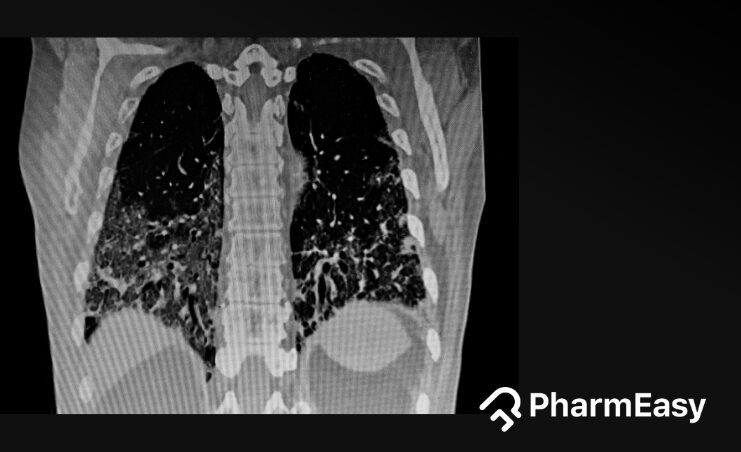Multifocal Pneumonia: A Comprehensive Guide to Symptoms and Treatment
By Dr. Shubham Pandey +2 more

Get,

to manage your symptom
Get your,


4 Cr+ families
benefitted

OTP sent to 9988776655



You’ve successfully subscribed to receive
doctor-approved tips on
Whatsapp

Get ready to feel your best.

Hi There,



Register to Avail the Offer
Send OTPBy continuing, you agree with our Privacy Policy and Terms and Conditions

Hi There,

Trusted by 4 crore+ families

OTP sent to 9988776655



You have unlocked 25% off on medicines




Code: NU25

By Dr. Shubham Pandey +2 more
Table of Contents
Multifocal pneumonia affects more than one area of the lung. Learning about multifocal pneumonia can help detect symptoms and select management options.
In this article, we’ll explore causes, risk factors, symptoms, and management options. By the end, you’ll know more about this type of pneumonia and how it’s different from others. Lastly, we will answer some frequently asked questions regarding this topic.

Did you know?
Pneumonia is an illness that makes your lung air sacs inflamed. It fills them with fluid or pus. This triggers coughing, fever, and difficulty in breathing. The different kinds of pneumonia are as follows.
Community-acquired pneumonia (CAP) occurs outside of healthcare zones. Bacteria, viruses, or fungi can cause it. It can take place on its own or occur after a cold or flu.
Hospital-acquired pneumonia (HAP) also called nosocomial infection is an infection acquired during a hospital stay. It’s more severe due to antibiotic-resistant bacteria and some patients’ health issues.
When substances like food, drink, saliva, or vomit get breathed into the lungs, aspiration pneumonia can occur. It is more common in those with problems swallowing or a gag reflex.
Multifocal pneumonia is specific pneumonia with infections in more than one lung area. It can happen inside the same lobe or across different ones. Microorganisms such as viruses, bacteria, and fungi cause it. Those with weaker immune systems are more at risk.
The causes of multifocal pneumonia are as follows.
If you are older, you smoke, have chronic lung diseases (COPD/ bronchial asthma), or have a weakened immune system (as in the case of HIV/AIDS, organ transplant, or cancer patients), then you are at a higher risk of getting multifocal pneumonia.
Multifocal pneumonia symptoms can change from person to person. Yet, there are a few usual symptoms which are as follows.
Seeing a doctor is important. You must do so when:
Multifocal pneumonia is diagnosed by things like a physical check-up, scanning with machines, and laboratory tests.
A healthcare professional will check your medical history, symptoms, and risk factors when they examine you. They may listen to lung sounds to find any issues.
Scanning with machines, like the chest X-ray or CT scan, detects pneumonia. It shows how bad it is.
Laboratory tests like blood tests or sputum culture help find the cause of pneumonia. This helps in deciding the management option.
Multifocal pneumonia management will depend on its cause. A mix of medicines and supportive care helps.
Bad cases of multifocal pneumonia can require a stay in the hospital. They may also need added care, like
You may reduce the risk by following certain steps. These include:
Multifocal pneumonia can have serious fallouts if not treated soon and well. These can be:
Knowing the symptoms, causes, and management of multifocal pneumonia will aid in handling and avoiding it. Detecting it early and managing it avoids more health problems. Staying healthy and having good habits may help avoid this kind of pneumonia.
How fast you get better from multifocal pneumonia changes. It could be a few days for some. For others, it could take weeks or more. Factors like age, health, and how bad the infection is will affect recovery time.
The time varies. It could last a few days to several weeks, based on what caused it and the management given. Your doctor can tell you more about your case.
The medication for multifocal pneumonia depends on its cause. A doctor will enlist antibiotics for a bacterial infection, antivirals for a viral one, and antifungals for a fungal infection.
Respiratory syncytial virus (RSV) might cause multifocal pneumonia. However, it’s often seen in people with weaker immune systems or lung issues. Usually, it’s linked to smaller breathing problems, like bronchiolitis and common colds.
Disclaimer: The information provided here is for educational/awareness purposes only and is not intended to be a substitute for medical treatment by a healthcare professional and should not be relied upon to diagnose or treat any medical condition. The reader should consult a registered medical practitioner to determine the appropriateness of the information and before consuming any medication. PharmEasy does not provide any guarantee or warranty (express or implied) regarding the accuracy, adequacy, completeness, legality, reliability or usefulness of the information; and disclaims any liability arising thereof.
Links and product recommendations in the information provided here are advertisements of third-party products available on the website. PharmEasy does not make any representation on the accuracy or suitability of such products/services. Advertisements do not influence the editorial decisions or content. The information in this blog is subject to change without notice. The authors and administrators reserve the right to modify, add, or remove content without notification. It is your responsibility to review this disclaimer regularly for any changes.

Leave your comment...
Comments